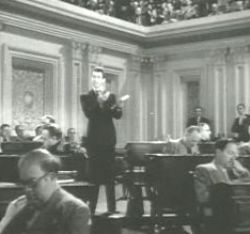I thought I’d use today’s post, written hours before the Senate opens up for business and possibly reanimates the corpse of the DREAM Act, to engage in some speculation about citizen activism, and its impact upon the ruling political class.
A few days ago I was Skype-chatting with a group of like-minded individuals I know from a mutually shared Web forum that no longer exists. Some are libertarians, some are conservatives, some anarchists, some liberals, but the common denominator is that most have a fairly dim view of the current American political process. When I importuned some of them to get involved in defeating amnesty-or at the very least, ask some of their more politically active friends to do so-I was greeted with the virtual equivalent of a shrug.
One of the more anti-government members of this group suggested that the whole process of lobbying Congress in order to achieve a specific political goal, or to see your political philosophy enacted into law, was a futile endeavor. I was told that this whole exercise was useless because the people who control Capitol Hill and the federal bureaucracy are not going to respond to the concerns of a mere constituent. And as a somewhat cynical observer of the political process for most of my adult life, I have to say that this perspective is not without its merits.
Our congressmen and congresswomen are increasingly drawn from a shallow professional pool that reflects their shallow interests, i.e. lobbying and lawyering. They often enact legislation in defiance of the public will, but which benefits them politically, as well as conferring advantages upon small, politically connected, extremely wealthy special interests-in this case, the open borders lobby. It’s entirely possible that the esteemed members of the “greatest deliberative body” in the world, including those who have been ousted from office specifically due to their open borders philosophy, will use this last week of official business to ram through a bill bestowing upon illegal aliens many of the privileges denied to ordinary American citizens.
However, if the past few years have taught us anything, it is the influence that a concentrated, committed group of citizen-activists can exert over the political process in Washington D.C. After all, who was it that thwarted “comprehensive immigration reform?” First in the Bush administration, then stopped it dead in its tracks during the initial months of the Obama administration? The forces arrayed against us included the executive and legislative branches of government, almost the entirety of the mainstream media-including national newspapers like the Wall Street Journal, New York Times, and the Washington Post. We were opposed by enormously wealthy foundations and non-profits bankrolled by wealthy men like George Soros, and powerful oligarchs like Peter Burkle, Rupert Murdoch, and Mort Zuckerman, as well as foreign governments-most notably those of Mexico and Latin American nations, but also Ireland and other EU member states.
Almost every venue for the political, economic and artistic elite, whether it be academe, the motion picture industry, the arts & humanities, trans-national corporations, large agri-businesses, the hospitality industry, the mayors and city councils of large metropolises such as New York, Los Angeles, and Chicago, etc., etc., ad nauseam, expended both figurative and literal capital to advance their agenda of unfettered, mass immigration. And yet it is we who emerged from those debates victorious.
Why?
The answer is simple. Because we fought back! We used our minds and our bodies to grind the gears of open borders advocacy to a halt. A nation of Davids slew the Goliath of amnesty, and here we face it yet again, albeit in a different form. Now, I don’t want to give you any illusions as to the certainty of success in this latest battle. It’s entirely possible-perhaps even plausible-that the duplicitous, relentless forces that are trying to enact this latest amnesty will eventually succeed. But if the past provides us with any lesson, it’s that that scenario is by no means a foregone conclusion. Use today and tomorrow to prove to the cynical doubters that what happened once can happen again.








The one thing I haven’t figured out is why be in favor of open borders? What’s in it for the special interest? Is it about the cheap labor?
There are a lot of possible explanations, cheap labor being one of them. There’s also the pool of reliable, straight ticket Democratic voters in the future, which is why the Democrats are so enthusiastic about amnesty. There’s the pressure exerted by the media on Republican “moderates,” who mistakenly believe that they’ll garner large shares of the Hispanic vote-or that if they don’t support it they’ll be punished at the polls in future elections.